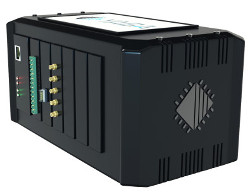Modular, open source automation controller runs on Raspberry Pi CM3
Nov 4, 2019 — by Eric Brown 3,027 views A modular, open-spec “YABA DesktopBox” controller and IoT gateway has launched on Indiegogo with an RPi CM3 based control board and an Arduino based analog and digital I/O board. A USB 3.1 backplane supports LVDS/EtherCAT and I2C buses.
A modular, open-spec “YABA DesktopBox” controller and IoT gateway has launched on Indiegogo with an RPi CM3 based control board and an Arduino based analog and digital I/O board. A USB 3.1 backplane supports LVDS/EtherCAT and I2C buses.
A startup called YABA (Yet Another Backplane Architecture) based in Italy and Latvia has gone to Indiegogo with an concept-stage campaign for a Linux-driven, open hardware industrial PAC/PLC controller, edge computer, and IoT gateway. For $334, you can invest in an initial “YABA DesktopBox” that runs Raspbian on a control board build around the Raspberry Pi Compute Module 3 (CM3).


YABA DesktopBox (left) and an exposed view that appears to show CPU module and I/O Slave module with an unidentified I/O module in the middle
(click images to enlarge)
The YABA DesktopBox is further equipped with an Arduino powered “I/O Slave” board and 6x device slots connected via a USB 3.1 Gen1 backplane. Using USB 3.1’s alternative mode, the YABA DesktopBox supports an I2C bus and high-speed LVDS buses for EtherCAT, M-BUS, and other fieldbus protocols.
Developed by computer engineer Giacomo Falcone and software developer Fanoel Nerini, YABA DesktopBox is billed as a mid-range alternative to expensive, proprietary industrial controllers that use a similar modular backplane design and low-cost solutions based on Linux hacker boards that require messy, complicated stacking or wiring schemes. Applications include industrial, home, and building automation, fieldbus/protocol and wireless gateways, sensor-based environmental monitoring, smart garden and aquarium, robotics, security, and voice/VOIP.

YABA family with YABA DesktopBox (top center-right) with future models including CubeBox, SlimBox, RackBox and OpenBox
(click image to enlarge)
Assuming YABA meets its $134K fixed goal by mid-December, the system will ship in July 2020. There are already designs for additional YABA models including CubeBox, SlimBox, RackBox and OpenBox — as well as additional control board alternatives to the RPi CM3. These include Linux-based, AI-enabled boards such as Nvidia Jetson and Google Coral, as well as RTOS-driven Micro Pic and STM Nucleo boards.


CPU Board module, front and back
(click images to enlarge)
The YABA boxes are built around a modular backplane that taps the 5Gbps USB 3.1 Gen1 standard delivered here via Type-C ports. Using USB 3.1 “alternate mode,” YABA dedicates the high-speed SSRTX2 lane for use as an EtherCAT/LVDS bus working at 100Mbps with a latency of 20 uS and a jitter of 1uS.
— ADVERTISEMENT —
Developers can alternatively use this lane for any communication protocol that can use a high-speed differential pair. In addition, SBU1/SBU2 pins are used for an I2C/SMBus serial bus with a speed of 100Kbps and a deterministic latency of 10ms.
The DesktopBox CPU control board is built around the Raspberry Pi CM3 module with a 1.2GHz quad-core, Cortex-A53 Broadcom BCM2837 and 1GB LPDDR2. The board adds 8GB flash, a 10/100 Ethernet port, and an HDMI port, as well as USB/I2C backplane connections.


YABA DesktopBox (left) and CPU Board specs
(click images to enlarge)
The I/O Slave board features an ATmega32U4 running an Arduino sketch. Features include 4x photo-coupled interfaces each for digital input and output plus 4x 10-bit analog inputs and 4x 8-bit analog outputs. It also integrates a USB/I2C backplane and a front I/O terminal block connector.
Like the CPU board, the I/O Slave board draws power via USB from the backplane, which is connected to a 12-30VDC supply. The DesktopBox also features an STM32G071 “smart features” MCU and an optional touchscreen on top of the box using an RS232/I2C “smart display interface.”
YABA plans to launch a “MarketSpace” where developers can sell hardware and software built around the open-spec platform. The main goal is to sell third-party YABA add-on boards that fit into the open device slots. YABA will designate basic, standard, or industrial certifications for the boards.
Further information
The YABA DesktopBox is available on Indiegogo for the next 45 days, with shipments expected in July 2020. The full range of YABA boxes are expected to be available for purchase by Q2 2021. More information may be found on the YABA Indiegogo page and YABA website.

Please comment here...